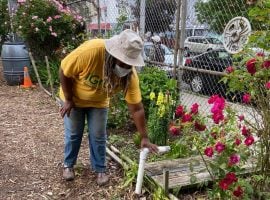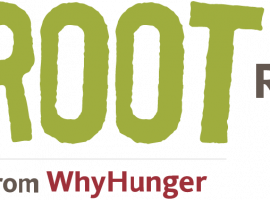 At the corner of 47th and Kingsessing Ave. in West Philadelphia there’s a sizable vacant lot. Lush and green with what appears to be random patches of tomato plants and squash running wild (and still laden with fruit in mid-October), it is one of 40,000 vacant lots now scattered throughout the city. What some residents see as an eye sore driving down property values, others, like Amy Wilson at Pedal Co-op, see the vacant lots as an opportunity to revitalize the local economy while addressing food access issues and saving the environment.
At the corner of 47th and Kingsessing Ave. in West Philadelphia there’s a sizable vacant lot. Lush and green with what appears to be random patches of tomato plants and squash running wild (and still laden with fruit in mid-October), it is one of 40,000 vacant lots now scattered throughout the city. What some residents see as an eye sore driving down property values, others, like Amy Wilson at Pedal Co-op, see the vacant lots as an opportunity to revitalize the local economy while addressing food access issues and saving the environment.
Amy is not alone in her vision. Across the United States, in cities like Detroit, MI; Oakland, CA; Minneapolis, MN; and Holyoke, MA, grassroots groups are creating jobs by reclaiming vacant lots to feed their communities and develop alternative eco-friendly business models. In October, I visited Amy and members of her crew to participate in a peer-to-peer learning exchange between Pedal Co-op, Compostadores, a Gardening Matters working group (Minneapolis, MN), and Nuestras Raices (Holyoke, MA). The three grassroots groups are peer mentors in WhyHunger’s www., a peer mentoring program that recognizes and promotes local community experts and supports them in sharing and exchanging their knowledge and skills with each other.
When I arrived on the scene at 47th and Kingsessing Ave., Patsy Parker of Compostadores, was leading a hands-on/all-hands-on-deck type of demonstration on how to build a compost bin. A graduate of Growing Power’s Commercial Urban Agriculture program, Patsy now leads compost bin building demonstrations in community gardens in Minneapolis. Patsy has made an art of building compost bins. Through Compostadores participation as a CLP peer mentor, she’s taking the show on the road. Loading up her van with everything she would need (hammers, staple guns, fencing, wire cutters, shingle nails), she headed Northeast to share her compost bin building skill with CLP peer mentoring partners Nuestras Raices and Pedal Coop. First stop Nuestras Raices in Holyoke, MA.
[nggallery id=21]
The site visit at Nuestras Raices begins with a tour of the 10 community gardens in the network paying close attention to composting methods. “We have a semi-sovereign relationship with the gardens,” says Diego Angarita, the Food Systems and Youth Director at Nuestras Raices, explaining that while Nuestras Racies provides funding to each of the gardens, each gardening community decides for itself how best to use the funds they receive. Likewise each garden also makes its own decision around composting. While each garden has its own way of composting, everything from a three-bin system to individual gardeners digging small trenches alongside a planting row, no one is composting to “grow soil” and most of them are doing it on an individual bases rather than as a community. Nuestras Raices signed up to participate in the Community Learning Project for Food Justice with a specific interest in learning how to design a community composting program based upon community leadership development and youth organizing.
The tour ended at “La Finca” the Nuestras Raices urban community farm and beginning farmer incubator site. With a petting zoo, farm stand, greenhouse, hoop house, livestock, youth garden, and a horse farm, the farm has all the ingredients to support an intensive composting operation which is the one thing it is missing.
After the tour, Diego, Amy, and Patsy did a bit of debriefing to assess the current systems, cultural aspects, and needs in terms of sustainability and community capacity for the community composting program. They then set up shop to build the demonstration model compost bin at the Nuestras Raices office. The next day, Patsy hit the road again, this time traveling with Diego and Amy south to Philadelphia for a site visit with Pedal Co-op.
[nggallery id=19]
Operating six days a week rain or shine, Pedal Co-op is a three person operation providing compost, recycling, and other hauling services exclusively by bicycle. Amy and fellow members of the cooperative collect valuable food waste from restaurants, coffee shops, and other small businesses and deliver it to partnering community gardens. Currently working with three gardens in the community, Amy and the Pedal Co-op crew are looking to expand their network and improve compost production at each site. To do this they’re working with Patsy and the Compostadore to improve their composting system and working with Nuestras Raices to learn effective community organizing strategies. The site visit at Pedal Co-op included building a second demonstration compost bin at the 47th and Kingsessing Ave. and a “shadow” bike ride along one of Pedal Co-op’s compost routes.
[nggallery id=20] In the process of building bins and over lunch and dinner the three partners also talked about a collaborative project focused on environment education and employment opportunities for youth. As they move forward with their individual composting projects they’ll also be working collaborative on developing youth curriculum that will encompass complement each groups expertise in waste management, community organizing, and growing nutrient rich soil. So stay tuned for future updates.
The Compostadores, Nuestras Raices, and Pedal Co-op are 1 of 6 partnerships participating in the 2011 Community Learning Project for Food Justice. www. to learn more.
Related posts:
- Sharing Knowledge and Growing Community Power – The Community Learning Project for Food Justice
- On the Road in Milwaukee, WI: Working Together to Build Community Power
- On the Road: Mandela MarketPlace, Oakland, California





